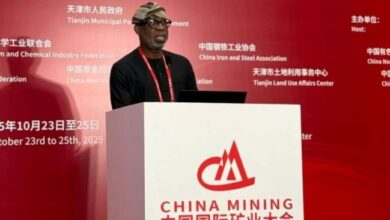N200bn Presidential palliative programme will support businesses in Nigeria – Minister
 Dr Doris Anite, Minister, Industry, Trade, and Investment(FMITI), says President Bola Tinubu Administration’s N200 billion Presidential Palliative Programme will support businesses in Nigeria.
Dr Doris Anite, Minister, Industry, Trade, and Investment(FMITI), says President Bola Tinubu Administration’s N200 billion Presidential Palliative Programme will support businesses in Nigeria.
Anite said this during her presentation at the Ministerial Sectoral News Conference in commemoration of President Bola Tinubu’s first anniversary on Tuesday in Abuja.
She said the programme, aimed at catalysing economic growth, provided grants to nano businesses and loans to Micro, Small and Medium Enterprises (MSME) and manufacturers at single- digit interest rates.
Anite said the ministry in partnership with the Bank of Industry (B.O.I.) successfully began phased disbursement of the grants in line with the palliative programme.
The minister said President Tinubu was committed to supporting manufacturing and industrial clusters for industrialisation.
ABH announces 2024 $1.5m business pitch for entrepreneurs growth, development
“The ministry had commenced the initial process of mapping out major industrial clusters across the country to provide these with targeted intervention, thereby enhancing their vibrancy and competitiveness.”
She said a lot of industrial clusters were still not connected to efficient and affordable power supply, but the ministry had started connecting some of them in order to support businesses in Nigeria.
“We are flagging off our “Light Up” campaigns starting with the Agbara Industrial zone which is not connected to the power grid. We are connecting it to the power grid.
“We will connect the Danwanu market in Kano to captive gas power. We are connecting the Nnewi Industrial Cluster to gas.
“We will continue to focus on supporting industries until all industrial hubs have electricity and gas to manufacture cheaper and more competitively.
“This strategic move signifies our resolve to harness clusters as engines of economic growth and development, fostering innovation, job creation, and inclusive prosperity across Nigeria in line with the Renewed Hope Agenda.”
Anite said President Tinubu inaugurated the Presidential Compressed Natural Gas(CNG) Initiative, and the ministry would flag off the conversion and manufacturing of CNG trucks and trailers to carry goods for trade.
The minister said the initiative would drop the cost of carrying goods and see the cost of production drop significantly.
“Let me emphasise here again that just powering industries from distributed power or captive power alone will reduce cost of production by 60 per cent.
“Then reducing the cost of transportation by converting trucks and trailers to CNG instead of diesel will drop that cost again by 60 per cent.
“The combined effect of this alone will shift our industries from loss making ventures into huge profit ventures, thereby having a multiplier effect.
“This will not only reduce the cost of products we buy, but will reduce food inflation significantly and make us compete favorably in our exports.”
Anite said another initiative of President Tinubu to stimulate industrialisation was the Mass Metering Initiative.
She said through the initiative, Nigeria could easily become a major production hub for meters, not just in Nigeria, but also supplying the African continent.
Anite said the ministry was developing a Resurgence Plan for Optimised Performance of the Nigerian Cotton, Textile and Apparel Industry in partnership with development partners and private sector players.
“We have attracted 3.5 billion dollar investment capital to unlock this sector.”
She said to unlock the potential opportunities inherent in the nation’s automotive sector, the ministry had come up with a strategy to ensure Nigeria’s automotive industry supplied 40 per cent of its component locally.
Anite said this was being done in collaboration with the National Automotive Design and Development Council (NADDC).
“According to her, we don’t have to use our FOREX to buy things we can produce.We don’t have to import if we can make it.
She said the ministry was set to inaugurate the SME Connect platform that would connect vendors and supply chains to offtakers and link them to financing for invoice discounting and trade financing.
“We will focus on turning our industrial hubs into special economic zones and free trade zones. This is important to ensure that there is a level playing ground for industries within and outside the zones”
Anite said to further support industrialisationand support businesses in Nigeria, the ministry had issued Import Duty Exemption Certificate (IDEC) letters of recommendation to no fewer than 50 manufacturers to boost expansion and production capacity.
“Additionally, we are implementing growth programmes through the Backward Integration Program(BIP) for the following products – raw sugar, palm oil, automobile assembly, battery assembly, cassava starch and tomato concentrate and others.
“We are supporting the needles and syringe industry and the health sector to ensure we have a constant supply of hygienic instruments and devices”.











